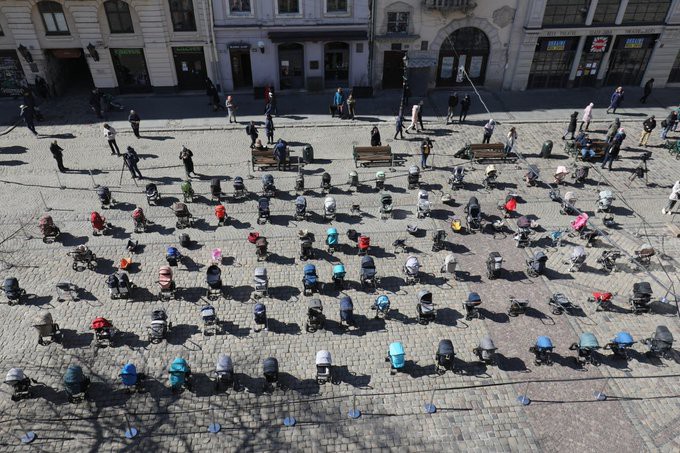The photo shows Rynok Square in Lviv with 109 empty baby strollers symbolizing 109 children killed during the first 23 days of war (March 18, 2022)
Every day of the war in Ukraine, Russian occupants kill on average five children, according to Ukrainian juvenile prosecutors. Vadym Boychenko, mayor of Mariupol, calls the situation in the city a genocide. TV channels inform about the shelling of “green corridors” and the inability to deliver humanitarian assistance to besieged populations. Cities are being wiped out, including apartment buildings, schools, kindergartens, hospitals, cultural facilities, and churches.
Both organizers and immediate perpetrators of war crimes against Ukrainians, such as killings of civilians and destruction of civilian infrastructure, should face responsibility. Not surprisingly, Ukrainians are eager to know how to prosecute Vladimir Putin and his culprits and when this can happen.
The Ukrainian government and civil society organizations are working hard to hold Russia accountable for its crimes against peace, security, humanity, and international law order. In addition, Ukrainian diplomats are seeking a solution to force Russia to pay reparations and contributions for the damage it has done to Ukraine.
On March 16, Ukrainian President Volodymyr Zelensky talked to Karim A.A. Khan, Chief Prosecutor of the International Criminal Court (ICC), who is now in Ukraine and started working to collect necessary evidence. On February 28, Khan stated his intention to launch an investigation into the situation in Ukraine as soon as possible, and on March 2, the ICC opened a formal investigation following referrals by 39 countries related to the war in Ukraine. The ICC’s Office of the Prosecutor asked to send the relevant information to the email at [email protected] and soon launched a special web platform and a mobile application to gather evidence about the Russian invasion of Ukraine. The web platform can be accessed at https://bit.ly/3MRFZs9.
Ukrainian government institutions have also started collecting evidence. Prosecutor General’s Office of Ukraine launched a website https://warcrimes.gov.ua/ and, as of March 23, has recorded 2,401 crimes of aggression and war crimes and identified 127 suspects within an overall criminal case opened in relation to the Russian invasion. The Security Service of Ukraine launched a Telegram chatbot at @russian_war_tribunal_bot and also collects information via email at [email protected] and 24/7 hotlines +38(068)1289229, +38(066)6829937, and +38(063)0665937 (Signal, WhatsApp, Telegram).
Leading Ukrainian human rights NGOs, including OPORA Civil Network, have also been collecting evidence about war crimes and submitting them to international tribunals:
- OPORA Civil Network: https://russiancrime.org
- Information Center on Human Rights, Ukrainian Helsinki Human Rights Union, and Ukrainian Legal Consulting Group: [email protected]
- Euromaidan SOS: [email protected]
A joint project of the Kyiv School of Economics (KSE), the Office of the President of Ukraine, and the Ministry of Economy of Ukraine collects information about material damage inflicted upon citizens and the state due to the Russian aggression. Its webpage can be accessed at https://damaged.in.ua/. This data is crucial for assessing losses of the Ukrainian state and citizens due to the Russian invasion and preparing materials for lawsuits against Russia in international courts related to the restitution of these losses.
As of March 17, the KSE estimated that Ukrainian infrastructure had suffered losses amounting to UAH 1.8 trillion or USD 62.6 billion. 411 educational buildings, 36 healthcare facilities, and at least 1,600 residential buildings have been destroyed, damaged, or captured since the war started.
Another Telegram chatbot @SaveEcoBot is used to collect information about environmental crimes committed by Russian troops on the territory of Ukraine, such as damage to nuclear power plants, destruction of sewage treatment plants, or setting forests on fire. The Ministry of Environmental Protection and Natural Resources of Ukraine and the State Ecological Inspectorate of Ukraine are analyzing the obtained information.
Meanwhile, the Ministry of Culture and Informational Policy of Ukraine developed a website https://culturecrimes.mkip.gov.ua/ for documenting war crimes against humanity and destructions of objects of cultural heritage. Russian forces have been demolishing churches, mosques, synagogues, and religious educational buildings in various regions of Ukraine.
Only time will tell what the judicial process and subsequent reparations will look like. It is crucial, however, to document war crimes and damage done by the occupant forces here and now.
